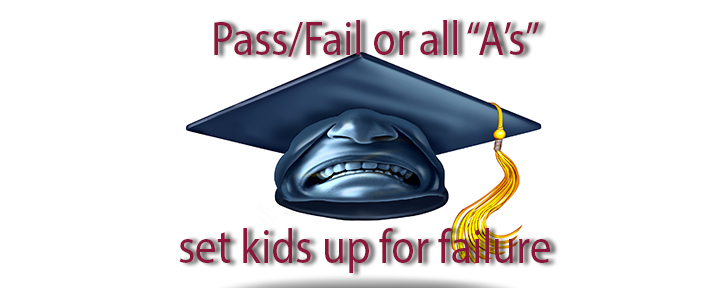
I was disappointed that so many high schools have opted to give pass/no pass grades during this spring 2020 semester. Then I just heard something even more ridiculous: San Francisco has proposed to give all middle and high school students A’s for this semester. As a college advisor, I’m concerned that students will not get the foundation in their academic classes that they’ll need next semester, and that they will be at a disadvantage when they apply to colleges because many of their peers will have real grades for this semester on their transcripts.
I do realize that school administrators are facing pressure that some students don’t have access to high-speed internet or computers. This socioeconomic inequity in education needs to be changed – I agree wholeheartedly — but we can’t do it in the middle of a pandemic. For elementary and middle school students, grades aren’t essential and won’t affect their future the way they will for high school students.
When high school students know that they will receive A’s in all classes regardless of their attendance, homework completion, and ability to show knowledge of subject matter, it certainly won’t inspire them to learn or do the work. Seriously, why would students crack open a book or join Zoom classes if they didn’t have to? How will college admissions officers know the difference between a “D” student and an “A” student when they both receive the same “pass” or all students receive “A’s” on their transcript?
Some high schools have announced that they will give letter grades to all students in all classes. These students will have an advantage in the college-admissions process if they receive A’s and B’s. It shows that despite the shelter-in-place orders and the transformation from on-campus classes to virtual classes, these students better managed their academics and personal life challenges than students who didn’t get high marks.
I’ve also noticed that class-instruction time has dropped during the past month. At first, many students went one-to-three weeks without any instruction as teachers and administrators were thrown into chaos as they set up their zoom or virtual classes. Then some teachers created YouTube pre-recorded lectures for the students to watch every day and gave students homework to complete every night. Other teachers offered real-time classes with students using Zoom or other virtual platforms. This gave students time to interact with one another and have some sense of a regular school routine. I was impressed by these teachers and their students appreciated the normalcy this provided. But, soon after, I’ve watched school districts restructure class schedules. Now, most of the clients I see have maybe 30 minutes of actual teacher-led classes per week. Some teachers have online classes once per week and the students work independently the rest of the week. One thing is for sure: students are NOT receiving the instruction or personal guidance they need, and they will definitely enter future classes with less knowledge and a weaker foundation.
This will cause a kind of social graduation. Why? School districts and families don’t want students to retake this semester, and I understand their reasons. But, if the students are not learning the concepts and building the skills that they normally would during this semester, allowing them to take the next class in the series will cause dumbing down of future classes. For instance, let’s take a Spanish 2 high school class that doesn’t complete the last 2 months of real instruction. When students get a “pass” or an “A” in that class, they move on to Spanish 3 in the fall. The Spanish 3 teacher will expect incoming students to have a Spanish 2 foundation, which they won’t. That requires the Spanish 3 teacher to introduce the Spanish 2 concepts that the students missed in addition to all of the Spanish 3 concepts for the year. That’s not really possible, so teachers continue to pass students to the next level without the foundation needed to be successful.
The problem doesn’t stop in high school. College professors complain that students enter as freshmen without basic skills like reading comprehension, essay writing, science foundation, and more. I’ve talked to professors who say they feel like they’re teaching remedial classes in college. By passing students who haven’t learned the concepts on to higher-level classes, we are setting up an educational system that produces poor quality students.
There is a solution. We don’t have to drop our expectations for all students because some don’t have access to the internet or computers. Before the 1990s, we didn’t have internet or computers in every home. Let’s get books – yes, real books – out to students who can’t join Zoom classes. Let’s bring back the pencil and paper so students can write essays. Let’s snail mail these essays and homework assignments to teachers. Students can write research papers in lieu of taking final exams. There are many ways we can continue to teach, engage, and grade our students.
That said, let’s not short change our students because of the coronavirus. Let’ step up to the challenge of teaching them the concepts virtually or through good ol’ fashioned books and writing on paper and pencils.
The post Why giving A’s (or passes) to all students will cause dumbed-down classes in the future appeared first on Merit Educational Consultants.
